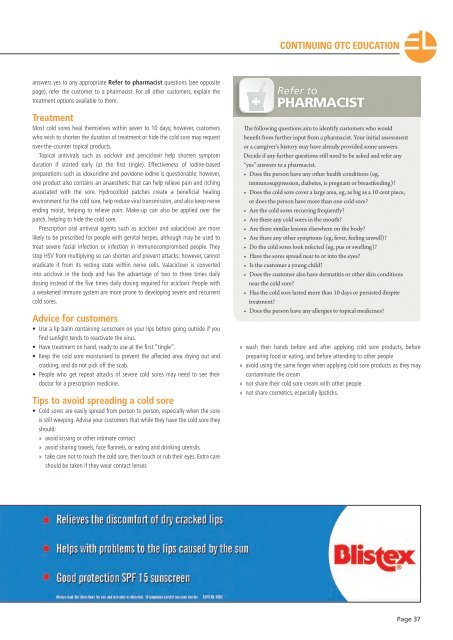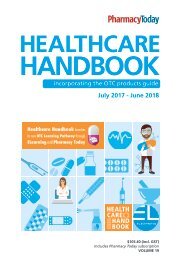2017 HCHB_digital
You also want an ePaper? Increase the reach of your titles
YUMPU automatically turns print PDFs into web optimized ePapers that Google loves.
CONTINUING OTC EDUCATION<br />
answers yes to any appropriate Refer to pharmacist questions (see opposite<br />
page), refer the customer to a pharmacist. For all other customers, explain the<br />
treatment options available to them.<br />
Treatment<br />
Most cold sores heal themselves within seven to 10 days; however, customers<br />
who wish to shorten the duration of treatment or hide the cold sore may request<br />
over-the-counter topical products.<br />
Topical antivirals such as aciclovir and penciclovir help shorten symptom<br />
duration if started early (at the first tingle). Effectiveness of iodine-based<br />
preparations such as idoxuridine and povidone-iodine is questionable; however,<br />
one product also contains an anaesthetic that can help relieve pain and itching<br />
associated with the sore. Hydrocolloid patches create a beneficial healing<br />
environment for the cold sore, help reduce viral transmission, and also keep nerve<br />
ending moist, helping to relieve pain. Make-up can also be applied over the<br />
patch, helping to hide the cold sore.<br />
Prescription oral antiviral agents such as aciclovir and valaciclovir are more<br />
likely to be prescribed for people with genital herpes, although may be used to<br />
treat severe facial infection or infection in immunocompromised people. They<br />
stop HSV from multiplying so can shorten and prevent attacks; however, cannot<br />
eradicate it from its resting state within nerve cells. Valaciclovir is converted<br />
into aciclovir in the body and has the advantage of two to three times daily<br />
dosing instead of the five times daily dosing required for aciclovir. People with<br />
a weakened immune system are more prone to developing severe and recurrent<br />
cold sores.<br />
Advice for customers<br />
• Use a lip balm containing sunscreen on your lips before going outside if you<br />
find sunlight tends to reactivate the virus.<br />
• Have treatment on hand, ready to use at the first “tingle”.<br />
• Keep the cold sore moisturised to prevent the affected area drying out and<br />
cracking, and do not pick off the scab.<br />
• People who get repeat attacks of severe cold sores may need to see their<br />
doctor for a prescription medicine.<br />
Tips to avoid spreading a cold sore<br />
• Cold sores are easily spread from person to person, especially when the sore<br />
is still weeping. Advise your customers that while they have the cold sore they<br />
should:<br />
»»<br />
avoid kissing or other intimate contact<br />
»»<br />
avoid sharing towels, face flannels, or eating and drinking utensils<br />
»»<br />
take care not to touch the cold sore, then touch or rub their eyes. Extra care<br />
should be taken if they wear contact lenses<br />
Refer to<br />
PHARMACIST<br />
The following questions aim to identify customers who would<br />
benefit from further input from a pharmacist. Your initial assessment<br />
or a caregiver's history may have already provided some answers.<br />
Decide if any further questions still need to be asked and refer any<br />
“yes” answers to a pharmacist.<br />
• Does the person have any other health conditions (eg,<br />
immunosuppression, diabetes, is pregnant or breastfeeding)?<br />
• Does the cold sore cover a large area, eg, as big as a 10 cent piece,<br />
or does the person have more than one cold sore?<br />
• Are the cold sores recurring frequently?<br />
• Are there any cold sores in the mouth?<br />
• Are there similar lesions elsewhere on the body?<br />
• Are there any other symptoms (eg, fever, feeling unwell)?<br />
• Do the cold sores look infected (eg, pus or swelling)?<br />
• Have the sores spread near to or into the eyes?<br />
• Is the customer a young child?<br />
• Does the customer also have dermatitis or other skin conditions<br />
near the cold sore?<br />
• Has the cold sore lasted more than 10 days or persisted despite<br />
treatment?<br />
• Does the person have any allergies to topical medicines?<br />
»»<br />
wash their hands before and after applying cold sore products, before<br />
preparing food or eating, and before attending to other people<br />
»»<br />
avoid using the same finger when applying cold sore products as they may<br />
contaminate the cream<br />
»»<br />
not share their cold sore cream with other people<br />
»»<br />
not share cosmetics, especially lipsticks.<br />
Page 37



